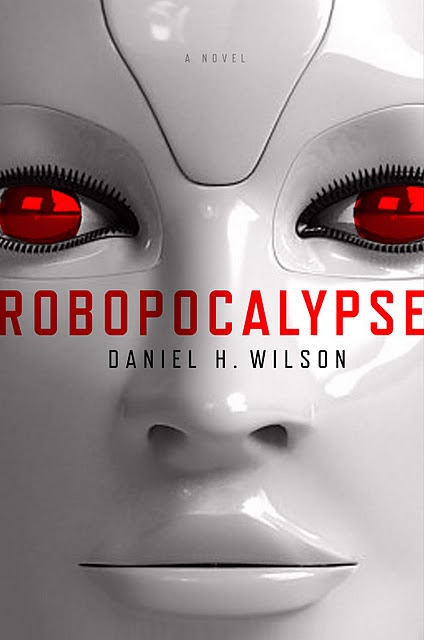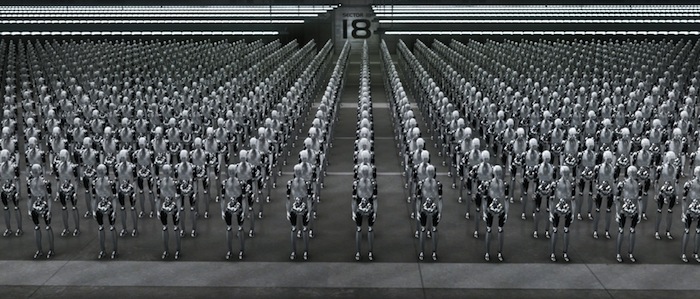Welcome to For Your Consideration, a column at Hollywood.com that turns a spotlight to non-big screen media that should be of interest to any film fan, be it a TV show, a video game, a book or any other inherently cinematic bit of awesomeness.
 Some people fear the current financial crisis spiraling out of control and hitting catastrophic status. Some people fear dirty bombs and a new dawn of nuclear war. Some people even fear that, when there is no more room left in Hell, the dead will walk the Earth.
Some people fear the current financial crisis spiraling out of control and hitting catastrophic status. Some people fear dirty bombs and a new dawn of nuclear war. Some people even fear that, when there is no more room left in Hell, the dead will walk the Earth.
All of those people are stupid.
The only thing we as a species need to fear is the robopocalypse; our inevitable downfall at the steely hands of our servo-powered servants.
Sure, we’ve seen our society’s inexorable fate depicted in books, TV and film before, but writer/roboticist Daniel H. Wilson’s is gunning for the crown with his markedly ambitious new book Robopocalypse, which Steven Spielberg is already attached to direct.
Who Wrote It: Daniel H. Wilson, who has a PhD in Robotics from Carnegie Mellon, writer of How to Survive a Robot Uprising and How to Build a Robot Army, both of which have been optioned for the big screen, though neither has yet to make the transition.
What’s It About: The robopocalypse, duh. But more specifically, it takes place in a not too distant future where robotics have become more and more domestic. Think of it like an I, Robot type future (the movie, not the book). And just like with I, Robot, an Artificial Intelligence evolves beyond its programming capacity and lusts to stop mankind from further destroying itself and the world. Unlike the various AI’s in past films and books with a similar agenda, Robopocalypse’s Archos has much more personality and imagination. Instead of simply flipping an invisible roboswitch from good to bad, he’s got a meticulously orchestrated plan that will take years to gloriously unfold.
The book’s narrative is told in a World War Z type format wherein a survivor of the New War has discovered the AI’s black box. He then transcribes key stories and exchanges that were remotely observed and recorded by Archos for battle strategy study purposes. Thus we are given a post-war examination of just how the war unfolded, where it’s various turning points were and who its unlikely heroes are.

Why You Should Read It: Before trying to convince you to read Robopocalypse, I’m going to explain that I don’t think it’s a great book by any stretch. In fact, its desperate desire to be “World War Z…but with robots!” bugged the hell out of me more and more as the book went on. I’ve got no problem with the post-war format that Max Brooks’ pulled off so brilliantly, but Wilson just flat out doesn’t understand how that dynamic should work. He’ll preface each chapter with something along the lines of, “This was a transcription of a conversation recorded by various ATM cameras 3 months before zero hour.” What follows isn’t actually a transcription — it’s first person prose. Even when it is an actual transcription, the subjects don’t talk in an organic way whatsoever.
I realize that’s a very specific complaint, but it really does take you right out of the world of the book. Had he simply stuck to the whole “these are the untold stories of the New War, as recorded directly by an omnipresent artificial intelligence,” Robopocalypse would be an amazing book. But since Wilson doesn’t do that; since he tries again and again to show off his prose, it’s got seams all over the place that I really wish weren’t there.
The best compliment I can pay Robopocalypse is that, even though Wilson doesn’t fully understand how to employ his chosen story telling technique, he does have an incredibly badass story to tell. This isn’t a Skynet uprising. This isn’t a bunch of glorified roombas going haywire. This is a world filled with rich, multi-purpose robots that all become specialized soldiers in an army controlled by a brutal A.I. It’s very easy to read and see why Steven Spielberg optioned the film rights before the book had even been sold to a publisher. It has some very cool, highly-entertaining ideas in it that leap off the page and into your cinematic mind’s eye.


